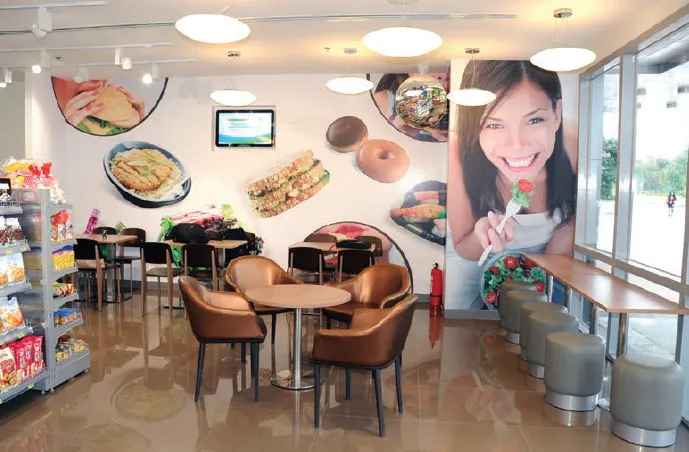
Philippines succumbs to lure of convenience stores
The Philippines has finally caught the attention of global investors, even those in the hyper-competitive retail industry, and these can be reflected in the proliferation of convenience stores across the nation. Tina Arceo-Dumlao writes more.
With its fast and steady economic growth averaging roughly 6% over the past six years, young population of more than 100 million and the huge and still-increasing remittances from Filipinos living and working abroad of average US$24 billion a year, the Southeast Asian country is a boon to those in the consumer sector.
Data from real estate consulting firm Jones Lang LaSalle show that new retail developments in the second half of last year added 37,800sqm of retail space, fuelled by robust international and local demand. And such growth is seen to continue despite potentially challenging economic conditions here and abroad. One industry that is reaping the benefits of such healthy growth in the consumer sector is the convenience store industry.
The Philippine operations of Japan based FamilyMart, for example, note that the total number of convenience stores in the Philippines — those that typically operate 24 hours a day — will double by 2020. In 2014 alone, the growth of convenience stores against other retail channels was the fastest at 8% over the previous year.
The growth of these convenience stores in the country is largely attributed to the development and expansion of urban centres and cities within Metro Manila and the provinces.
According to FamilyMart in a statement, “the convenience-driven lifestyle has become a major inuencer to the way of life of Filipinos. With time becoming a precious commodity, products and services that provide convenience will be a major factor in the decision making process of where to eat and where to shop.”
“The more independent, self-sustained millennial market also influences the growth in convenience stores as this generation now leaves the maternal homes earlier than past generations, and can aord to stay and live on their own. Hence, cooking or eating at home is replaced with eating out, either alone or with friends. e convenience store format has then become their go-to place for simple meals and quick xes,” adds FamilyMart .
To respond to this growth, FamilyMart Philippines has expanded and set up shop in the central business districts of Makati, Manila and Artigas with store count now at more than 100. These are in high-density areas with big groups of young corporate workers, the ideal customer prole of convenience stores.
Despite the mushrooming of convenience stores, FamilyMart is optimistic that there is still room for growth, sharing data that the average ratio for the convenience store format in Asia is 25,000 customers to one. In the Philippines, it is around 41,000 to one convenience store.
Thus, the market is deemed “grossly underserved”, presenting a “huge opportunity” for the convenience store operators, whose buyers typically buy fewer items but visit more frequently.
To help keep it top of mind, FamilyMart Philippines plans to introduce more ready-to-eat products. It will also be investing in commissaries to ensure the high quality of food, variety, freshness and volumes. What it wants is to become “the other food shop or dining option” for time-starved, quality searching Filipinos.
It has 104 stores to date and will be adding 10-15 more this year. It will ramp up its aggressive programme starting 2017 to reach its goal of 500 stores in the next three to five years.
Ministop, the convenience store chain under the Gokongwei group of companies, has also seen a dramatic increase in the footprint of the convenience store industry in the Philippines, especially over the past ve years.
Prior to the entry of FamilyMart in 2013, the main players were just Ministop and 7-Eleven, both franchises of foreign brands. e combined store count of both Ministop and 7-Eleven at the end of 2011 was only 1,015. is has grown to nearly 2,500 stores at the end of last year, which includes new entrants Familymart, Circle K and Lawson.
Another brand, Alfamart, does not operate 24 hours a day but competes for the same space as a convenience store.
For Ministop, the growth is driven to a large degree by increasing investments and activities in the business process outsourcing (BPO) sector, which includes the one-million strong call centre industry, which operates practically 24 hours a day. For those working the graveyard shift, the convenience stores and their ready-to-eat meals are a godsend.
Ministop says in an interview that BPO employees patronise the convenience stores because of their round-the-clock operations. ese stores are open at night when the BPOs have to service clients from the other side of the world. They also cater to homes and schools, those in transport terminals and near hotels and recreational facilities.
Despite the exponential growth over the past six years, Ministop sees the growth pace gathering speed in the near future, due to the demand for convenience and accessibility.
“Moreover, convenience stores are so popular with people on a budget and always on the go. Convenience stores sell beverage, snacks, confectionery and other food and non-food products, including ready-to-eat and in-store prepared meals, for the growing grab-andgo market,” Ministop says.
Given the bright prospects, it is but natural for other companies to muscle into its territory, but Ministop, which enjoys a rst mover advantage along with 7-Eleven, is preparing itself well against competition, both old and new.
“We just stay focused on our value proposition and dierentiation in the market. We are the only convenience store chain in the market, for example, with an in-store kitchen so we serve our ready-to-eat food freshly cooked. Product development in this category has also remained a priority,” says Ministop.
For this year, Ministop says the priority is to improve profitability rather than just expansion. Same-store sales already grew at a robust 7% at the end of the rst quarter this year, thus it is on the right track.
“We will slow down on our expansion this year and focus more on getting new franchisees as we re-embark on aggressively expanding our store network,” says Ministop. “We also always try to excite the market with our new F&B offering. We plan to launch more new products this year.”
Lawson, yet another convenience store from Japan, is admittedly a late entrant to the Philippines’ retail scene, but the Puregold retail group, which is the majority partner in the joint venture with Lawson Japan, nevertheless believes that there is business still yet to be made here.
PG Lawson chair Leonardo Dayao says the joint venture expects the number of its branches to grow this year to between 50 and 70.
“We project accelerated opening of new stores starting this year as we gain hands-on experience,” says Dayao, who said the past three years saw the growth of the convenience store industry at a level not seen in prior years.
“Convenience stores answer two important needs — convenience and value for money. They become true to their name of convenience by locating themselves in strategic spots, operating 24 hours a day and serving ready-to-eat food,” Dayao says. “Another attraction is the aordable merchandise and small sizes, making the products affordable or within reach of most customers.”
Banking on the continued growth of the Philippine economy and the opening up of new urban areas outside the capital, PG Lawson expects to have 500 Lawson convenience stores by 2020. Each store has an average size of 80sqm- 100sqm.
Its figures show that there are about 25,000 convenience stores in the country when the market can accommodate at least 50,000 or twice the number, indicating space for new companies such as Lawson to operate and earn a profit.



















 Advertise
Advertise





